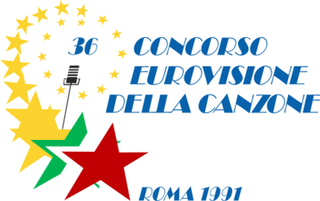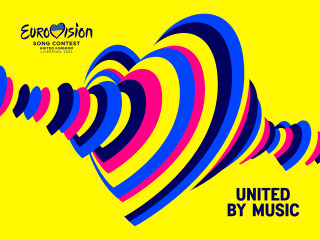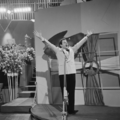
The Eurovision Song Contest 1991 was the 36th edition of the Eurovision Song Contest, held on 4 May 1991 at Stage 15 of the Cinecittà Studios in Rome, Italy. Organised by the European Broadcasting Union (EBU) and host broadcaster Radiotelevisione italiana (RAI), and presented by Gigliola Cinquetti and Toto Cutugno, the contest was held in Italy following the country's victory at the 1990 contest with the song "Insieme: 1992" by Toto Cutugno.

"Non ho l'età ", usually given as just "Non ho l'età" is a song recorded by Italian singer Gigliola Cinquetti, with music composed by Mario Panzeri and lyrics by Nicola Salerno. It represented Italy in the Eurovision Song Contest 1964, held in Copenhagen, winning the contest, having previously won that year's Sanremo Music Festival.

San Marino has participated in the Eurovision Song Contest 14 times, debuting in the 2008 contest, followed by participation from 2011 onward. The nation did not participate in 2009 or 2010, citing financial difficulties. Having failed to qualify in their first four attempts, the nation qualified for the contest's final for the first time in 2014. Valentina Monetta represented San Marino in 2012, 2013 and 2014, making her the first entrant to participate in three consecutive contests since the 1960s. In 2019, Serhat managed to qualify to the final, marking the second appearance of the country in a Eurovision final and achieving their best result to date of 19th place. Following the 2020 contest's cancellation due to the COVID-19 pandemic in Europe, their 2020 candidate Senhit was again selected to represent San Marino in the following contest. She qualified to the final, making it the first time that San Marino made it to two consecutive finals.
On 2 December 2010, the European Broadcasting Union (EBU) announced that Italy would compete in the Eurovision Song Contest 2011, set to be held in Düsseldorf, Germany. Italy returned to the contest after a 13-year absence, having last competed in the 1997 contest. The entry was organised by Italian broadcaster Radiotelevisione Italiana (RAI) and finished second after the winning song from Azerbaijan.
Italy participated in the Eurovision Song Contest 2013 in Malmö, Sweden. The Italian entry was selected through an internal selection with the artist being selected by a special committee from the participants of the Sanremo Music Festival 2013 and the song selection being carried out by the artist. Marco Mengoni represented Italy with the song "L'essenziale", which placed 7th and scored 126 points in the final.
Italy participated in the Eurovision Song Contest 2014 in Copenhagen, Denmark. Their entry was selected internally by the Italian broadcaster Radiotelevisione italiana (RAI). Emma represented Italy with the song "La mia città". In the final, Italy placed 21st, scoring 33 points.

Italy debuted at the Junior Eurovision Song Contest when the twelfth edition of competition was held in Malta in 2014. The Italian broadcaster, RAI, selected the debut entry of country via an internal selection as "Tu primo grande amore" by Vincenzo Cantiello, which went on to win with a total of 159 points. This made Italy the second country to win with the debut entry after Croatia's victory in the first edition. Before Italy debuted, there were two entries sung in Italian: "Birichino", which represented Switzerland in 2004 and "O-o-o Sole intorno a me" which represented San Marino in 2013.
Italy participated in the Eurovision Song Contest 2015 with the song "Grande amore", written by Ciro Esposito and Francesco Boccia. The song was performed by the male operatic pop trio Il Volo. Italian broadcaster RAI announced in September 2014 that the winning performer(s) of the Sanremo Music Festival 2015 would have the right to represent the nation at the Eurovision Song Contest in Vienna, Austria. The selected performer would also be given the right to choose their own song to compete with at Eurovision. In February 2015, Il Volo emerged as the winners of Sanremo with the song "Grande amore". The trio accepted the invitation to represent Italy at Eurovision and decided that "Grande amore" would be their contest entry.
Italy participated in the Eurovision Song Contest 2016 with the song "No Degree of Separation" written by Federica Abbate, Francesca Michielin, Cheope, Fabio Gargiulo and Norma Jean Martine. The song was performed by Francesca Michielin. Italian broadcaster Radiotelevisione italiana (RAI) announced in October 2015 that the winning performer(s) of the Big Artists section of the Sanremo Music Festival 2016 would have the right to represent the nation at the Eurovision Song Contest in Stockholm, Sweden. The selected performer would also be given the right to choose their own song to compete with at Eurovision. The group Stadio ended up winning the Big Artists section, however they declined the opportunity to represent Italy in Stockholm. RAI then appointed the runner-up, Francesca Michielin, as the Italian entrant. Michielin performed a bilingual Italian and English version of her Sanremo runner-up entry "Nessun grado di separazione", which was titled "No Degree of Separation" at the Eurovision Song Contest 2016.
Italy participated in the Eurovision Song Contest 2017 with the song "Occidentali's Karma", written by Francesco Gabbani, Filippo Gabbani, Luca Chiaravalli and Fabio Ilacqua. The song was performed by Francesco Gabbani. Italian broadcaster Radiotelevisione italiana (RAI) announced in October 2016 that the winning performer(s) of the Big Artists section of the Sanremo Music Festival 2017 would earn the right to represent the nation at the Eurovision Song Contest in Kyiv, Ukraine. The selected performer would also be given the right to choose their own song to compete with at Eurovision. In February 2017, Francesco Gabbani emerged as the winner of Sanremo with the song "Occidentali's Karma". The artist accepted the invitation to represent Italy at Eurovision and decided that "Occidentali's Karma" would be his contest entry.
Italy participated in the Eurovision Song Contest 2018. Italian broadcaster RAI announced in October 2017 that the winning performer(s) of the Big Artists section of the Sanremo Music Festival 2018 would earn the right to represent the nation at the Eurovision Song Contest in Lisbon, Portugal.
Italy participated in the Eurovision Song Contest 2019. Italian broadcaster RAI announced in November 2018 that the winning performer(s) of the Sanremo Music Festival 2019, later turning out to be Mahmood with "Soldi", would earn the right to represent the nation at the Eurovision Song Contest in Tel Aviv, Israel.
Italy originally planned to participate in the Eurovision Song Contest 2020. The winner of the "Campioni" section of the 70th Sanremo Festival, Diodato with "Fai rumore", would have represented Italy at the Eurovision Song Contest 2020, which was planned to be held in Rotterdam, the Netherlands. However, the contest was cancelled due to the COVID-19 pandemic.

The Eurovision Song Contest 2022 was the 66th edition of the Eurovision Song Contest. It took place in Turin, Italy, following the country's victory at the 2021 contest with the song "Zitti e buoni" by Måneskin. Organised by the European Broadcasting Union (EBU) and host broadcaster Radiotelevisione italiana (RAI), the contest was held at the PalaOlimpico, and consisted of two semi-finals on 10 and 12 May, and a final on 14 May 2022. The three live shows were presented by Italian television presenter Alessandro Cattelan, Italian singer Laura Pausini and Lebanese-born British-French singer Mika.
Italy participated in and won the Eurovision Song Contest 2021. Italian broadcaster RAI announced in October 2020 that the winning performer(s) of the Sanremo Music Festival 2021, later turning out to be Måneskin with "Zitti e buoni", would earn the right to represent the nation at the Eurovision Song Contest in Rotterdam, the Netherlands. Måneskin eventually became the sixty-eighth winner of the Eurovision Song Contest and the first Italian entry to win the contest in 31 years. Italy received a total of 524 points, winning the public vote with 318 points and coming at fourth place in the jury vote with 206 points.
The Sanremo Music Festival 2021, officially the 71st Italian Song Festival, was the 71st edition of the annual Sanremo Music Festival, a television song contest held in the Teatro Ariston of Sanremo, organised and broadcast by RAI. The show was held between 2 and 6 March 2021.

The Eurovision Song Contest 2023 was the 67th edition of the Eurovision Song Contest. It took place in Liverpool, United Kingdom, as Ukraine, the winner of the 2022 contest with the song "Stefania" by Kalush Orchestra, was unable to host the event due to the Russian invasion of the country. It was organised by the European Broadcasting Union (EBU), with the British Broadcasting Corporation (BBC) acting as host broadcaster on behalf of the Public Broadcasting Company of Ukraine (UA:PBC). The contest was held at Liverpool Arena, and consisted of two semi-finals on 9 and 11 May and a final on 13 May 2023. The three live shows were presented by British singer Alesha Dixon, British actress Hannah Waddingham, and Ukrainian singer Julia Sanina, with Irish television presenter Graham Norton joining for the final.
Italy hosted the Eurovision Song Contest 2022 in Turin, having won the previous edition with "Zitti e buoni" by Måneskin. Italian broadcaster RAI announced that the winning performer(s) of the Sanremo Music Festival 2022, later turning out to be Mahmood and Blanco with "Brividi", would earn the right to represent the nation at the contest. As both the host country and a member of the "Big Five", Italy automatically qualified to the final.
Italy participated in the Eurovision Song Contest 2023 in Liverpool, United Kingdom. Italian broadcaster RAI announced in June 2022 that the winning performer(s) of the Sanremo Music Festival 2023, later revealed to be Marco Mengoni with "Due vite", would earn the right to represent the nation at the contest.
Italy participated in the Eurovision Song Contest 2024 in Malmö, Sweden. Angelina Mango the winning performer of the Sanremo Music Festival 2024, organised by Italian broadcaster RAI, earned the right to represent the nation at the contest with her winning entry "La noia".





















